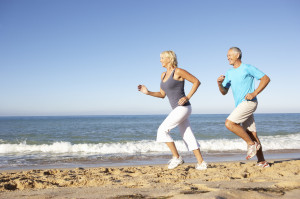Someone asked me the other day, “What is the Definition of Fitness?”
Interesting question I thought especially if you want to make the most of the short time we all have on this earth so why not have a look and see what my trusty dictionary has to say.

The Oxford Dictionary states that fitness is “the condition of being physically fit and healthy”: disease and lack of fitness are closely related.
And the online Free Dictionary says that fitness is “Good health or physical condition, especially as the result of exercise and proper nutrition”.
It is also hard to imagine that over 2,500 years ago Aristotle defined the standards of ‘fitness’ as a state of being when a thing/individual meets its most appropriate purpose.
In today’s society, the state of being is far less complex than the day of Aristotle with our bodies contributing to one overall function and purpose – our desire to live a healthy and long life free of disease and other medical or physical conditions.
So really, I feel you would have to say it is the overall well-being and appearance of the body. In other words, something we alone have full control over.
By exercising regularly and maintaining a balanced diet throughout your life it is possible to achieve this goal. Fitness of your cardiovascular system, lungs, skeleton, muscles and endocrine system will take care of the physical issues whereas diet will control many, if not all, of today’s lifestyle diseases.
Paying close attention throughout your life to exercise and diet is your lifeline when it comes to anti-aging.
Through exercising the different parts of your body you will therefore increase your level of physical activity causing various positive physical and mental effects including an increase in blood flow and circulation of oxygen throughout the body. This promotion of blood flow and oxygen circulation will also result in a removal of negative and damaging cellular waste products.
Another positive aspect of exercise is its effect on your lungs.
Due to the increased physical activity, your lungs will be required to increase their oxygen intake and exhale negative carbon dioxide – a waste product caused by certain biochemical reactions. This promotion of oxygen circulation will also lessen the risk of heart disease.
Here is another of the important benefits of physical fitness.
Contrary to popular belief, not all cholesterol is bad for you. In fact there is a ‘good cholesterol’ which can be moderated and maintained through regular exercise.
The ‘good cholesterol’ is known as High-Density Lipoprotein or HDL and regulates all blood sugar levels in the body, converting fat into sugars necessary to provide energy.
This process is the procedure required to avoid obesity and is why those who do not exercise gain weight.
Potentially the most obvious advantage of any fitness routine is the external effects, which often act as the motivation for most people who begin exercising. The toned body, increased muscle mass and healthier looking skin contributes to increased endurance and strength, as well as improved self-esteem and overall body awareness.
There are many and varied types of exercise regimes you can choose from depending on which parts of the body you would like to build or tone.
The high-intensity aerobic type programs are more suited to people who are interested in improving strength as well as their cardiovascular and pulmonary systems.
But if you are more focused on muscle tone, balance and flexibility, then you may be interested in low-intensity Pilates and yoga sessions. Of course, these are only a couple of the many exercise routines available to exercise your body and increase your fitness levels.
You must remember that the body operates as an integrated whole so any exercise you do will have an overall and lasting benefit. You just have to keep at it and the benefits will flow.
These benefits can be further experienced from either intense, moderate or minimal daily exercise efforts.
In fact, a 30 minute workout three to five days per week will have a very positive effect on your overall fitness and well-being. These activities do not have to be specific exercise programs but could include things like brisk walks or daily jogs without any equipment.
For some more intense options you could include gym workouts, a hard game of tennis, bike riding or even laps in a swimming pool. Don’t like doing laps…..then go for a surf like I do.
As Aristotle said, to function well is to live well and be fit.
Leave a Reply